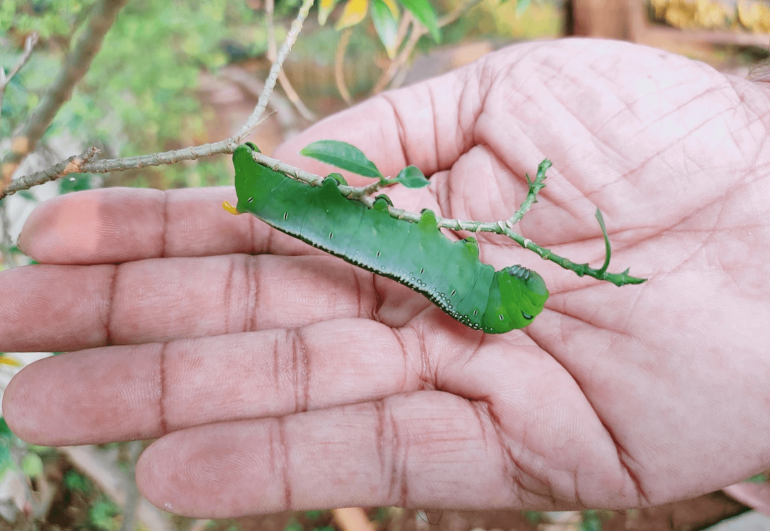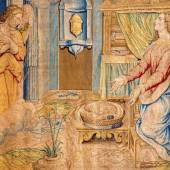The Spirituality of ‘a little’ versus ‘the more’

Father Ittoop Panikulam, SVD, seeks to incarnate hope reflecting on the life of Jesus – littleness can make all the difference.
Dear caterpillar, you will be a butterfly in a few days. You will enchant the onlookers; you will be fed on a liquid sugary diet, drinking nectar from flowers, living from a day to a month or a little longer. And then you will disappear into thin air. You will do all that is to be done, to meet all your needs. Your life gets guided by your bodily intelligence.
The inbuilt mechanism won’t allow you to have an extra bit more than what you need. You are content with “a little.” There is an unseen yet demarcated boundary around your needs. Your life and the whole of creation are held in the palm of the Creator God. And you just follow the inner guidelines without even ever knowing it. And you can’t go wrong.
This life principle of living by “a little” based on the demand of your genuine needs and not craving beyond them is followed by all living beings, from an ant to an elephant, from a worm to a dinosaur. There are no “millionaires” or ‘billionaires’ in the animal world. The only creatures that break this law and go beyond our own needs are we, humans. With the gift of freedom, we certainly choose to do all that we want and crave and give no one else a chance to interfere, including God, so that we can follow at will the desire “to have more.”
Did the caterpillar thoughts inspire the minimalists? Who knows! Or are they part of the ‘woke’ generation, ‘woken up to the timely issues of social injustice, inequality and the pathetic cosmic degradation? Anyway, we know in 2011, a book appeared, titled ‘Minimalism,’ co-authored by Millburn Joshua and Nicodemus Ryan. They promote a minimalist lifestyle, with a supportive thought-backup with ancient and ever new principles.
Minimalism took its wings through Netflix documentaries in 2016. The good news of ‘minimalism’ began to spread further through writers and speakers, podcasters and filmmakers, cartoonists and caricaturists, satirists and humourists. Some portrayed the obese and the overweighed maximalists vs. the skinny and emaciated minimalists. They marketed the idea that you can simplify lives if you go by your needs and amplify them by your greed. The choice is yours.
Maximalists are least convinced of the outdated ideas of these foolish newcomers. They are fully convinced of their centuries-old belief: ‘to be is to have more and more.’ The more you have, the bigger, the greater, the more important, the more noticed, the more popular, the more needed, the more wanted you become. They encourage following the insatiable hunger for more. The heart should beat to have more, the mind should think to have more, the feet should run to have more, and life should be lived to have more. ‘The more you have, the happier you become’ is the underlying mantra of maximalists. Maximalists seem to be the addicted thinkers of the ideology of ‘the more.’
Meanwhile, minimalists got tired of the bombasts and their cultic belief in externalism. They believe, ‘to have less leads you to be more.’ Peel of their decorations and they will see the penury in their hearts. They have become the clothes they wear, the cars they drive, the property they own, the palaces they occupy, the bank deposits they accumulate and the foodies they consume. The more they have, the more they would want to have. Imagine they live in fancy, hoping that they could be counted among the richest in the world one day.
The minimalists reminded me of an ancient sage, Epicurus (341-270 BC), who noted that “If a little is not enough for you, then nothing is.” What’s this, ‘a little’? ‘A little’ is all that you need like the needs of a caterpillar or an elephant. The problem begins with “a little more than a little’. A little more than a little has limitless ‘a littles’ waiting behind the beeline of wants. It is an endless journey for ‘the more.’ We get into a need-greed vicious circle: needs breeding greed and greed breading needs. He knew that the story of greed would continue to be unstoppable. So it was. So it is. So it will be.
Suppose you are looking for a radical forerunner, an undisputable life coach and a simple-living warrior of the spirituality of ‘a little’. In that case, we have it all in Jesus and what he kept on saying:
Jesus had a minimalist starting point: born in ‘a little’ manger.
He became a refugee at a very early age.
He lived in a carpenter’s little house till he left even that.
Then on, he had no house of his own.
He decided to have no address, no ID. He was his id — and no labels.
He chose hierarchically a very low seat.
His food habit: depended on what others gave.
(Different from John the Baptist who ate locusts and drank wild honey)
No one noticed what clothes Jesus wore; it was not of any importance to him. (John the Baptist wore camel’s hair and had a leather girdle around his waist)
He advised not to fall prey to money which has the hidden power of mammon (Satan). “You cannot serve God and mammon” (Matthew 6:24)
He minimised all the existing laws to one: Love.
“Love God and your neighbour as you love yourself.”
He minimized all kinds of devotions – in fact, none at all.
He neither practised nor promoted ascetical practices or ritualism.
He did not build a special place of prayer.
His choice of place for prayer was the hills and mountains, all alone, with the sky for the roof and earth for the floor.
He invited his disciples to say just one prayer: Our Father, emphasising three simple things in mind: daily remembrance of Abba, daily bread and daily forgiveness. He does not encourage them to think about the future needs, even the day after tomorrow.
He discouraged his disciples from saying many vocal prayers or loud utterances. If one feels for it, do them behind shut doors.
He sang no hymn.
The most important teaching of his view on minimalism can be framed as one word: “Beatitude.”
He lived a minimalist lifestyle: daily ‘go about doing good.’
He lived one message: Live lovingly, having minimal needs.
He died young, proving all that he preached and lived.
Didn’t Jesus follow the caterpillar spirituality of ‘a little’, entrusting his life in the palm of His Abba and all fellow humans as “fratelli tutti’?
By December 25, little mangers will soon appear all over the world, with a challenge on incarnating hope in who we are and not in what we have. If you manage to have hope in ‘a little,’ you will be blessed with hope all your life.
Radio Veritas Asia (RVA), a media platform of the Catholic Church, aims to share Christ. RVA started in 1969 as a continental Catholic radio station to serve Asian countries in their respective local language, thus earning the tag “the Voice of Asian Christianity.” Responding to the emerging context, RVA embraced media platforms to connect with the global Asian audience via its 21 language websites and various social media platforms.
















- Reply
Permalink